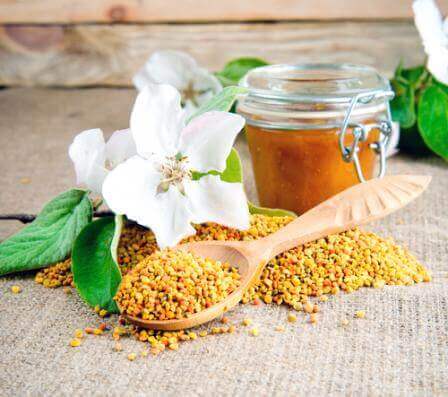Is Bee Pollen Good for You? Part 1
Bee pollen is said to contain all the nutrients needed to sustain life. Is bee pollen really nature’s most perfect food?
Stephanie writes, “I’ve heard a lot about bee pollen lately. Is it good for you? Is it really a miracle food?”
Bee pollen has been used throughout the ages and around the globe as a medicinal food and all-purpose elixir. There are references to the healing powers of bee pollen in ancient Egyptian and Chinese manuscripts, the Bible. and the Koran.
It’s still promoted today as a “superfood,” a term that’s generally applied to foods thought to be particularly nutritious. It’s also touted as a natural remedy for allergies and asthma, to enhance athletic performance, boost the immune system, guard against toxic effects from chemotherapy, and as a general health tonic. But is there any scientific basis for any of these alleged benefits? Let’s take a look at how the evidence for bee pollen stacks up.
Is Bee Pollen Nature’s Perfect Food?
Bee pollen is made up of pollen from flowering plants, which is collected by the bee as it roams around the world, mixed with small amounts of bee spit and nectar. Although it’s nutrient composition varies greatly depending on what plants the bee visited that day, most bee pollen is about 15% protein, less than 10% fat, and about 70% carbohydrate. It also contains various vitamins and minerals.
In fact, one of the claims for bee pollen is that it contains every nutrient needed for life. This has been demonstrated by experiments in which lab rats were fed nothing but bee pollen for up to a year and thrived. But even if the idea of eating nothing but a pound of a slightly bitter granular powder every day as your sole source of nutrition sounds appealing to you, I wouldn’t advise it.
One interesting difference between rats and humans is that rats can produce their own vitamin C and humans cannot. Unless your particular batch of bee pollen was unusually high in vitamin C, you’d probably end up with scurvy long before your year consuming it was up! Bee pollen is also essentially devoid of vitamins B12 and D and—if eaten as the sole source of nutrition—would provide dangerously high amounts of iron.
Of course, most of the people who swear by bee pollen aren’t eating a pound a day. They are simply stirring a spoonful into their juice or smoothie before heading out to leap tall buildings in a single bound. The amount of vitamins and minerals in that amount of bee pollen is equivalent to shaving off a tenth of a multi-vitamin tablet and dissolving it into your juice.
Enzymes and Nucleic Acids in Bee Pollen
If you check out some of the information about bee pollen on the Internet, you’ll also probably read that it contains live enzymes, as well as nucleic acids, which are special compounds that are found in the DNA and RNA of all living things. Enzymes and nuclieic acids are very important, to be sure. But they aren’t like vitamins: you don’t get them from your diet.
Most of the live enzymes that you consume with your food are denatured by your stomach acid—meaning that they can no longer function as enzymes. Then, they are broken down into individual amino acids. Whenever you need an enzyme (which happens about 1,000 times a second), one is assembled for you by special proteins in your cells. See also: What are the Benefits of a Raw Food Diet?
Likewise, research shows that any little bits of genetic material present in the foods do not end up in our bloodstream. Like enzymes, they are broken down and either recycled or eliminated.
In the interests of full disclosure, I should mention that bee pollen also contains various types of bacteria and fungi as well as trace amounts of heavy metals like lead and cadmium.
Health Benefits of Bee Pollen
As a source of nutrients, bee pollen doesn’t seem to offer anything that you couldn’t get from lots of other foods as well. But what about all the other special things it’s supposed to do for you, such as improve athletic performance, reduce symptoms of PMS and menopause, treat allergies and asthma, and even fight cancer?
After all, this stuff has been prized for millennia. And while some folk medicine is eventually revealed to be little more than superstition, many traditional remedies are found to be just as—or more—effective than modern drug therapies. On the other hand, there seems to be an inexhaustible market for superfoods and miracle cures—and most of the info you’ll find on bee pollen is from people who want to sell you some.
My search for evidence on bee pollen turned up an interesting mix of scientific research, anecdotes, ancient wisdom, and marketing hype—and I’ll break all of it down for you in next week’s show, along with a look at any safety concerns.
Do you have some experience—good, bad, or indifferent—with bee pollen? I’d like to hear about it. Post your thoughts below or on the Nutrition Diva Facebook page.
References
Anderson KE, Carroll MJ, et al. Hive-stored pollen of honey bees: many lines of evidence are consistent with pollen preservation, not nutrient conversion. Molecular Ecology. 2014;23(23):5904-5917.
Campos MG, Bogdanov S, et al. Pollen composition and standardisation of analytical methods. Journal of Apicultural Research and Bee World 47(2): 156–163 (2008)
Harmanescu, M et al. Mineral micronutrients composition of bee’s pollen. Journal of Agroalimentary Processes and Technologies, Volume XIII, No.1 (2007), 175-182.
Orzáez Villanueva MT, Díaz Marquina A, et al. The importance of bee-collected pollen in the diet: a study of its composition. Int J Food Sci Nutr. 2002 May;53(3):217-24.
Snow JW, Hale AE, et al. Ineffective delivery of diet-derived microRNAs to recipient animal organisms. RNA Biol. 2013 Jul;10(7):1107-16.
Bee and bee pollen images courtesy of Shutterstock.







